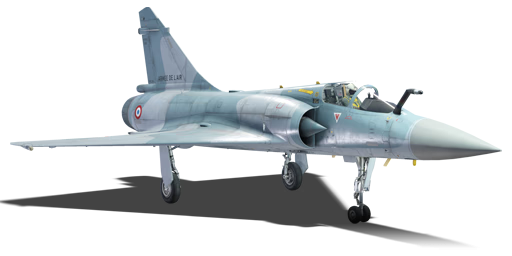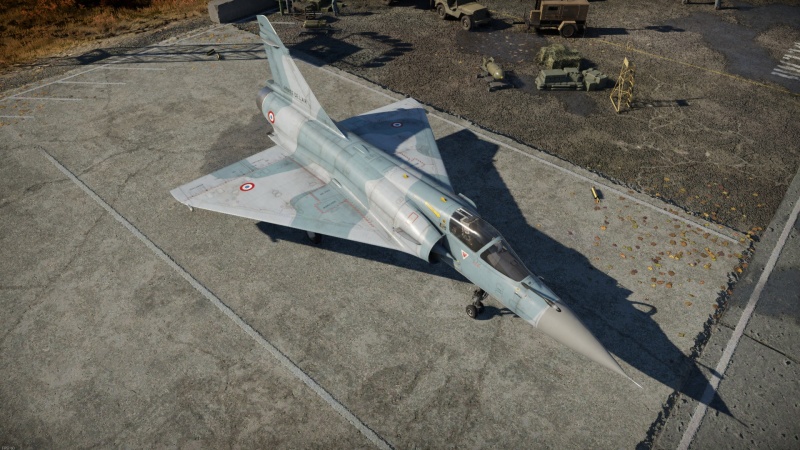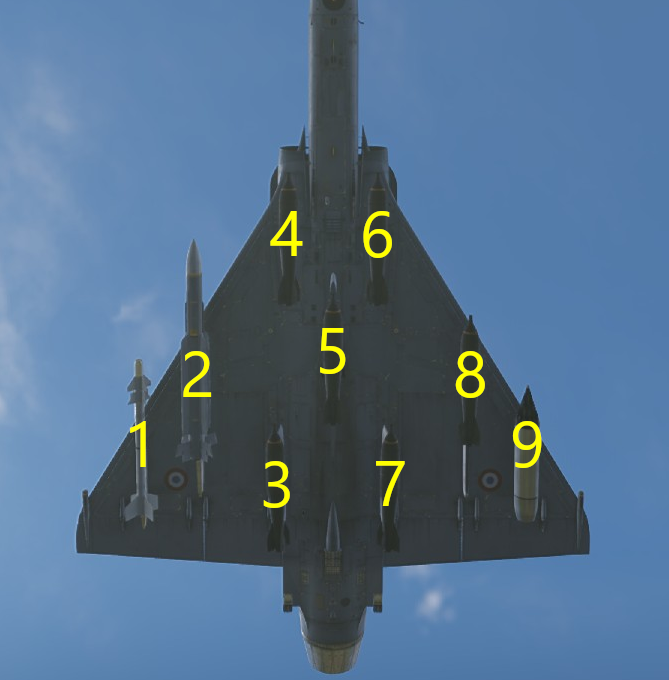Difference between revisions of "Mirage 2000C-S5"
(→Offensive armament: Updated) |
(→Pros and cons) |
||
| Line 204: | Line 204: | ||
* Poor energy retention | * Poor energy retention | ||
| − | * Low ammo count for the DEFA cannons | + | * Low ammo count for the DEFA cannons (only 250 rounds total) |
* Carries a maximum of only 4 missiles | * Carries a maximum of only 4 missiles | ||
* Very limited options for ground attack ordnance | * Very limited options for ground attack ordnance | ||
Revision as of 23:57, 26 March 2023
| This page is about the French jet fighter Mirage 2000C-S5. For other uses, see Mirage (Disambiguation). |
Contents
Description
The Mirage 2000C-S5 is a rank VIII French jet fighter with a battle rating of 12.0 (AB) and 12.3 (RB/SB). It was introduced in Update "Drone Age".
A timeless classic, and an icon of delta-wing fighter design, the Mirage 2000C-S5 is the penultimate production variant of the "C" variant of the Mirage 2000. Unlike the earlier production models of the Mirage 2000C, this version comes equipped with an upgraded SNECMA M53-P2 engine, an Eclair chaff-flare dispenser to increase the number of countermeasures available, as well as an improved Thomson-CSF RDI radar that allowed the use of the much improved Matra Super 530D missile.
General info
Flight performance
Pilots familiar with delta-wing fighter designs will be at home in the Mirage 2000. While you still bleed airspeed rapidly when pulling tight manoeuvres - which you can do quite easily thanks to its large delta wing, and leading-edge slats - speed is much less of a problem thanks to its new engine which provides excellent acceleration. Its combination of decent top-speed, exceptional acceleration, and its stunning nose authority ensures that anyone who finds the Mirage 2000 on their six o'clock is going to find it difficult to shake. Pilots of the Mirage 2000 will have to watch their energy at all times, ensuring they do not waste it all unwisely, leaving them in a vulnerable position.
| Characteristics | Max speed (km/h at 12,000 m) |
Max altitude (metres) |
Turn time (seconds) |
Rate of climb (metres/second) |
Take-off run (metres) | |||
|---|---|---|---|---|---|---|---|---|
| AB | RB | AB | RB | AB | RB | |||
| Stock | 2,262 | 2,204 | 16000 | 26.1 | 26.5 | 157.0 | 146.1 | 750 |
| Upgraded | 2,346 | 2,346 | 24.2 | 25.0 | 235.4 | 194.0 | ||
Details
| Features | |||||
|---|---|---|---|---|---|
| Combat flaps | Take-off flaps | Landing flaps | Air brakes | Arrestor gear | Drogue chute |
| X | X | X | ✓ | X | ✓* |
*Installing countermeasures blocks the deployment of the chute.
| Limits | ||||||
|---|---|---|---|---|---|---|
| Wings (km/h) | Gear (km/h) | Flaps (km/h) | Max Static G | |||
| Combat | Take-off | Landing | + | - | ||
| 1,512 | 426 | N/A | N/A | N/A | ~__ | ~__ |
| Optimal velocities (km/h) | |||
|---|---|---|---|
| Ailerons | Rudder | Elevators | Radiator |
| < 920 | < 750 | < 650 | N/A |
Engine performance
| Engine | Aircraft mass | ||||||
|---|---|---|---|---|---|---|---|
| Engine name | Number | Basic mass | Wing loading (full fuel) | ||||
| SNECMA M53-P2 | 1 | 7,570 kg | ___ kg/m2 | ||||
| Engine characteristics | Mass with fuel (no weapons load) | Max Gross Weight | |||||
| Weight (each) | Type | 10m fuel | 20m fuel | 30m fuel | 34m fuel | ||
| 1,450 kg | Afterburning low-bypass turbofan | 8,572 kg | 9,533 kg | 10,515 kg | 10,910 kg | 12,936 kg | |
| Maximum engine thrust @ 0 m (RB/SB) | Thrust to weight ratio @ 0 m (WEP) | ||||||
| Condition | 100% | WEP | 10m fuel | 20m fuel | 30m fuel | 34m fuel | MGW |
| Stationary | 6,200 kgf | 9,688 kgf | 1.13 | 1.02 | 0.92 | 0.89 | 0.75 |
| Optimal | 6,879 kgf (1,365 km/h) |
12,862 kgf (1,365 km/h) |
1.50 | 1.35 | 1.22 | 1.18 | 0.99 |
Survivability and armour
Examine the survivability of the aircraft. Note how vulnerable the structure is and how secure the pilot is, whether the fuel tanks are armoured, etc. Describe the armour, if there is any, and also mention the vulnerability of other critical aircraft systems.
Modifications and economy
Armaments
| Ballistic Computer | |||
|---|---|---|---|
| CCIP (Guns) | CCIP (Rockets) | CCIP (Bombs) | CCRP (Bombs) |
| |
|
|
|
Offensive armament
The Mirage 2000C-S5 is armed with:
- A choice between two presets:
- 2 x 30 mm DEFA 554 cannons, belly-mounted (125 rpg = 250 total)
- 2 x 30 mm DEFA 554 cannons + 90 x countermeasures
Suspended armament
The Mirage 2000C-S5 can be outfitted with the following ordnance presets:
- Without load
- 2 x Matra R550 Magic 1 missiles
- 2 x Matra R550 Magic 2 missiles
- 72 x SNEB type 23 rockets
- 2 x Matra Super 530F missiles
- 2 x Matra Super 530D missiles
- 7 x 250 kg SAMP Type 25 bombs (1,750 kg total)
Custom loadout options
| 1 | 2 | 3 | 4 | 5 | 6 | 7 | 8 | 9 | ||
|---|---|---|---|---|---|---|---|---|---|---|
| 250 kg SAMP Type 25 bombs | 1 | 1 | 1 | 1 | 1 | 1 | 1 | |||
| SNEB type 23 rockets | 18 | 18 | 18 | 18 | ||||||
| Matra R550 Magic 1 missiles | 1 | 1 | ||||||||
| Matra R550 Magic 2 missiles | 1 | 1 | ||||||||
| Matra Super 530D missiles | 1 | 1 | ||||||||
| Matra Super 530F missiles | 1 | 1 |
Usage in battles
The aircraft's weapons suite paired with its flight performance makes it a dangerous foe to any aircraft opposing it. The aircraft is a formidable foe in BVR engagements and even more so in a dogfight. This versatility offered by its great weapons and flight performance means that it can perform as a support fighter, slinging its Super 530D's from afar and at high altitudes. Thanks to its flight performance, it can also comfortably perform well as a frontline fighter, diving straight in to fire its Super 530D and excellent all-aspect IR R550 Magic 2 missiles. However, pilots of the Mirage 2000 will have to be careful of when they fire their missiles as it carries only 4 missiles in total, which is little compared to a lot of its competition. In addition, missiles such as the AIM-7F Sparrow, carried by some American fighters, possess a higher effective range than the Super 530D missile. Therefore, the Mirage 2000 pilots are advised to stay out of the range in which a longer-range missile can strike the Mirage, while being too far for the Mirage's Super 530D to strike back.
The worst-case scenario for a Mirage 2000 pilot would be to be caught in a low-altitude sustained turn (or rate fight) with an adversary such as the F-14 Tomcat, or the MiG-23MLD, which will create a host of problems for the Mirage 2000 that bleeds its airspeed quickly. The Mirage-2000 pilot will almost always prefer to dogfight at higher altitudes, avoiding sustained turns with enemies, and compensating for the rapid loss in energy by manoeuvring by converting altitude into airspeed that can be vital to victory as the Mirage manoeuvres into a position to secure victory.
When it comes to dogfighting, the Mirage's flight performance enables a skilled pilot to be a formidable adversary to any of its opponents, even to those such as the F-14A Early, and the MiG-23MLD. The Mirage's game plan should almost always be to get in, and out as quickly as possible. Taking advantage of the high AoA capability of the Mirage, and utilizing as much airspeed and altitude as possible is necessary to engage and defeat the target as quickly as possible, to give any prospecting enemies minimal time to find and defeat the Mirage while it is slow and vulnerable while busy in a dogfight.
Pros and cons
Pros:
- Has access to excellent Matra R550 Magic II and Matra Super 530D missiles
- Very good acceleration
- Great manoeuvrability
- Powerful pulse-Doppler radar
- DEFA cannons deal heavy damage
Cons:
- Poor energy retention
- Low ammo count for the DEFA cannons (only 250 rounds total)
- Carries a maximum of only 4 missiles
- Very limited options for ground attack ordnance
History
Origin
During the mid-1960s, France and Britain agreed to design a swing-wing aircraft (AFVG project). France later split up from the project due to high costs to develop their own swing-wing aircraft, ultimately becoming the Mirage G8. (West Germany would end up collaborating with Britain to create the Panavia Tornado.) However, the Mirage G8 was rejected for being too costly and unable to dogfight. Dassault focused on what would become the 2000C, a single-engine fighter that would be far less expensive than the Mirage G8 and also meet the requirements of the French Air Force (AdA).
Production
Due to its similarities with the Mirage III, it only took ~27 months to go from the project beginning to the first flight. The first prototype (Mirage 2000 No. 1) made its first flight on March 10, 1978, which lasted 65 minutes. The prototype was found to be both a high-speed aircraft (Mach 2) and an agile, capable dogfighter at low speeds. After 4 years, the first production Mirage 2000C (C abbreviated for chasseur: "fighter"), flew on the November 20, 1982. The French Air Force soon began to take delivery of the 2000Cs. The first 37 Mirage 2000Cs were the S1, S2, and S3, which included the SNECMA M53-5 engine and Thomson RDM radar. After the 37th Mirage 2000C airframe, they were upgraded to the SNECMA M53-P2 engine and RDI radar (Mirage 2000C-S4 - Mirage 2000C-S5). After No. 93, the Eclair countermeasure pod was replaced with countermeasure dispensers in the Karman fairings.
| Variant | Airframe number |
|---|---|
| Mirage 2000C-S1 | No. 1 - No. 15 |
| Mirage 2000C-S2 | No. 16 - No. ??? |
| Mirage 2000C-S3 | No. ??? - No. 37 |
| Mirage 2000C-S4 | No. 38 - No. 48 |
| Mirage 2000C-S4-1 | No. 49 - No. 63 |
| Mirage 2000C-S4-2 | No. 64 - No. 74 |
| Mirage 2000C-S5 | No. 75 - No. 124 |
Media
- Skins
- Videos
See also
Links to the articles on the War Thunder Wiki that you think will be useful for the reader, for example:
- reference to the series of the aircraft;
- links to approximate analogues of other nations and research trees.
External links
| Dassault Aviation | |
|---|---|
| WW2* | |
| Fighters | M.B.152C1 · M.B.157 |
| Bombers | M.B.162 · M.B.174A-3 · M.B.175T |
| Jet Aircraft | |
| M.D 450 | M.D.450B Barougan · M.D.450B Ouragan |
| Mystère | M.D.452 IIA · M.D.452 IIC · Mystere IVA |
| Super Mystère | Super Mystere B2 |
| Étendard | Etendard IVM |
| Super Étendard | Super Etendard |
| Alpha Jet | Alpha Jet E** |
| Mirage | |
| Mirage III | Mirage IIIC · Mirage IIIE · Milan |
| Mirage V | Mirage 5F |
| Mirage F1 | Mirage F1C · Mirage F1C-200 · Mirage F1CT |
| Mirage 2000 | Mirage 2000-5F · Mirage 2000C-S4 · Mirage 2000C-S5 · Mirage 2000D-R1 |
| Mirage 4000 | Mirage 4000 |
| Export | |
| M.D 450 | M.D.450B Ouragan |
| Mystere | Mystere IVA |
| Super Mystère | Sambad · Sa'ar*** |
| Mirage | Shahak · ▄Mirage 5BA |
| *The company was named "Société des Avions Marcel Bloch" before being renamed in 1947 | |
| **Jointly manufactured with Dornier Flugzeugwerke | |
| ***Israeli Super Mystère refitted with new avionics and an American engine | |
| See also | SABCA |
| France jet aircraft | |
|---|---|
| Fighters | M.D.450B Ouragan · M.D.450B Barougan · M.D.452 IIA · M.D.452 IIC · Mystere IVA · Super Mystere B2 |
| ▄F-86K · ▄F-100D · ▄F-8E(FN) | |
| Mirage IIIC · Mirage IIIE · Milan · Mirage 5F · Mirage 2000C-S4 · Mirage 2000C-S5 · Mirage 2000-5F · Mirage 4000 | |
| Mirage F1C · Mirage F1C-200 · Mirage F1CT | |
| Strike aircraft | ▄F-84F · F-84F IAF · ▄F-84G-26-RE |
| Etendard IVM · Super Etendard · Alpha Jet E | |
| Jaguar A · Jaguar E · Mirage 2000D-R1 | |
| Bombers | S.O.4050 Vautour IIA · Vautour IIA IDF/AF · S.O.4050 Vautour IIB · S.O.4050 Vautour IIN · S.O.4050 Vautour IIN (late) |
| Belgium | ▄Meteor F Mk.8 · ▄Mirage 5BA · ▄F-104G · ▄F-16A · ▄F-16AM |
| Netherlands | ▄Sea Hawk Mk.50 · ◘Hunter F.6 |






